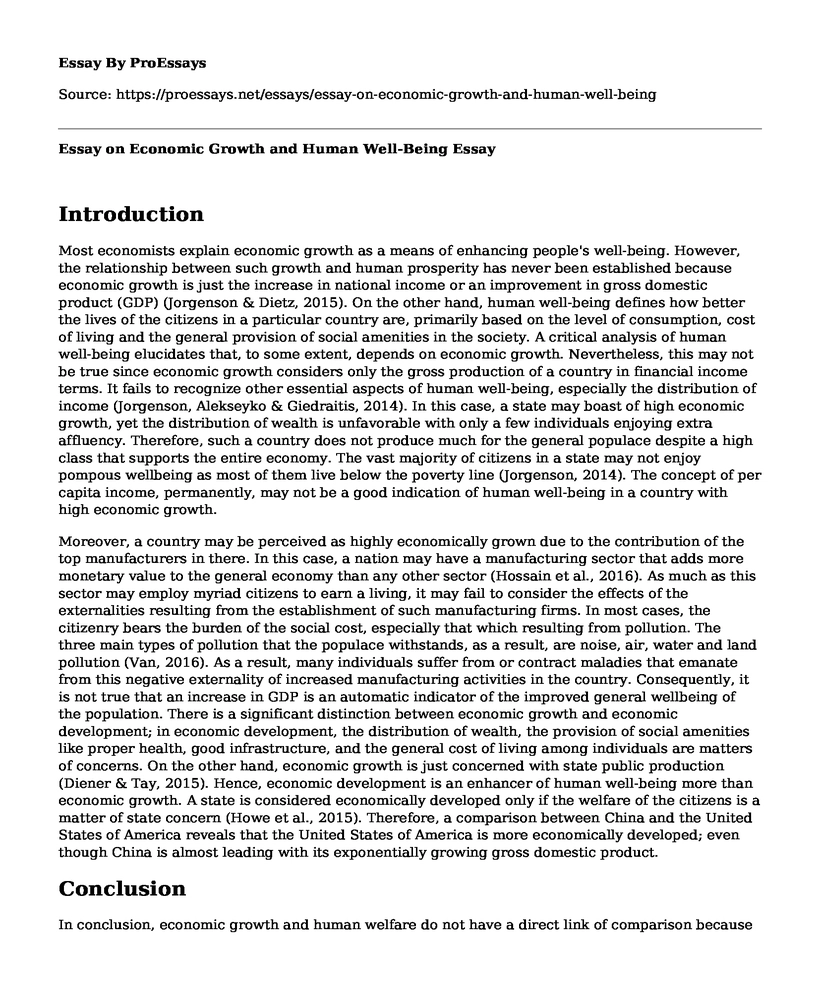Introduction
Most economists explain economic growth as a means of enhancing people's well-being. However, the relationship between such growth and human prosperity has never been established because economic growth is just the increase in national income or an improvement in gross domestic product (GDP) (Jorgenson & Dietz, 2015). On the other hand, human well-being defines how better the lives of the citizens in a particular country are, primarily based on the level of consumption, cost of living and the general provision of social amenities in the society. A critical analysis of human well-being elucidates that, to some extent, depends on economic growth. Nevertheless, this may not be true since economic growth considers only the gross production of a country in financial income terms. It fails to recognize other essential aspects of human well-being, especially the distribution of income (Jorgenson, Alekseyko & Giedraitis, 2014). In this case, a state may boast of high economic growth, yet the distribution of wealth is unfavorable with only a few individuals enjoying extra affluency. Therefore, such a country does not produce much for the general populace despite a high class that supports the entire economy. The vast majority of citizens in a state may not enjoy pompous wellbeing as most of them live below the poverty line (Jorgenson, 2014). The concept of per capita income, permanently, may not be a good indication of human well-being in a country with high economic growth.
Moreover, a country may be perceived as highly economically grown due to the contribution of the top manufacturers in there. In this case, a nation may have a manufacturing sector that adds more monetary value to the general economy than any other sector (Hossain et al., 2016). As much as this sector may employ myriad citizens to earn a living, it may fail to consider the effects of the externalities resulting from the establishment of such manufacturing firms. In most cases, the citizenry bears the burden of the social cost, especially that which resulting from pollution. The three main types of pollution that the populace withstands, as a result, are noise, air, water and land pollution (Van, 2016). As a result, many individuals suffer from or contract maladies that emanate from this negative externality of increased manufacturing activities in the country. Consequently, it is not true that an increase in GDP is an automatic indicator of the improved general wellbeing of the population. There is a significant distinction between economic growth and economic development; in economic development, the distribution of wealth, the provision of social amenities like proper health, good infrastructure, and the general cost of living among individuals are matters of concerns. On the other hand, economic growth is just concerned with state public production (Diener & Tay, 2015). Hence, economic development is an enhancer of human well-being more than economic growth. A state is considered economically developed only if the welfare of the citizens is a matter of state concern (Howe et al., 2015). Therefore, a comparison between China and the United States of America reveals that the United States of America is more economically developed; even though China is almost leading with its exponentially growing gross domestic product.
Conclusion
In conclusion, economic growth and human welfare do not have a direct link of comparison because human prosperity depends on myriad other factors outside the paradigm of the economy. A country may have low economic growth, but the well-being of its citizens is better than another country with high economic growth. It is essential to evaluate the level of economic development when determining the welfare of citizens in a state since it gives a bigger picture of the economy.
References
Diener, E., & Tay, L. (2015). Subjective wellbeing and human welfare around the world as reflected in the Gallup World Poll. International Journal of Psychology, 50(2), 135-149.
Hossain, M. S., Dearing, J. A., Rahman, M. M., & Salehin, M. (2016). Recent changes in ecosystem services and human well-being in the Bangladesh coastal zone. Regional Environmental Change, 16(2), 429-443.
Howe, C., Suich, H., Vira, B., & Mace, G. M. (2014). Creating win-wins from trade-offs? Ecosystem services for human well-being: a meta-analysis of ecosystem service trade-offs and synergies in the real world. Global Environmental Change, 28, 263-275.
Jorgenson, A. K. (2014). Economic development and the carbon intensity of human well-being. Nature Climate Change, 4(3), 186.
Jorgenson, A. K., & Dietz, T. (2015). Economic growth does not reduce the ecological intensity of human well-being. Sustainability Science, 10(1), 149-156.
Jorgenson, A. K., Alekseyko, A., & Giedraitis, V. (2014). Energy consumption, human well-being and economic development in central and eastern European nations: A cautionary tale of sustainability. Energy Policy, 66, 419-427.
Van den Berg, H. (2016). Economic growth and development. World Scientific Publishing Company.
Cite this page
Essay on Economic Growth and Human Well-Being. (2022, Apr 07). Retrieved from https://proessays.net/essays/essay-on-economic-growth-and-human-well-being
If you are the original author of this essay and no longer wish to have it published on the ProEssays website, please click below to request its removal:
- Essay Sample on Gender and Work-Life Balance
- Essay Sample on Globalization: A Business Perspective for Growth & Financial Gains
- Essay Example on Minimum Wage Debate: Pros & Cons
- Successful Employee Management Practices: Retention, Empowerment & Incentives - Essay Sample
- Feeling Unmotivated: My Story of Finding Employee Motivation - Essay Sample
- Essay Example on Globalization and Devolution: Impact on US Federalism
- NIH Employees Need a Union: Reasons Why - Essay Sample







